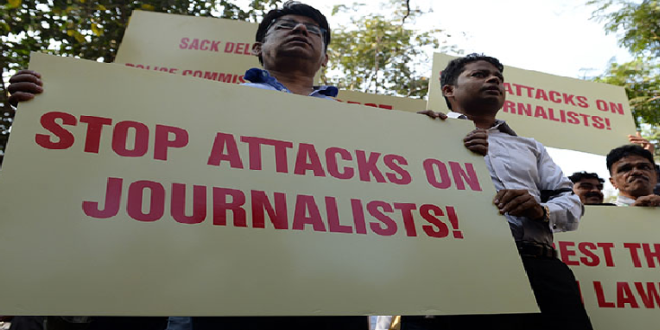16-07-2024
PARIS/ NEW DELHI: As Narendra Modi begins his third term as Prime Minister, Reporters Without Borders (RSF) is concerned about the growing campaigns against journalists perpetrated by extreme right-wing nationalist networks. The authorities who have remained silent on the subject must put an end to these attacks. Investigative journalist Srishti Jaswal, who infiltrated the groups that cyber-harassed her, spoke to RSF about the tactics of these trolls and the terrifying experience of being their target.
 “Voices who dare to speak out against the ruling party and the ideology disseminated by the far-right are immediately attacked by waves of trolls, threatened, and branded as ‘traitors’ or as ‘anti-national’.’ This constant harassment has created a climate of fear, driving much of the Indian press into self-censorship. RSF condemns this tactic, engineered by far-right networks, to destroy the credibility of journalists and silence them. The Indian authorities must put an end to this scandal at all costs, which has been stifling the right to information for ten years. The perpetrators of harassment and defamation campaigns against journalists must be prosecuted and brought to justice. This total impunity can no longer continue.”
“Voices who dare to speak out against the ruling party and the ideology disseminated by the far-right are immediately attacked by waves of trolls, threatened, and branded as ‘traitors’ or as ‘anti-national’.’ This constant harassment has created a climate of fear, driving much of the Indian press into self-censorship. RSF condemns this tactic, engineered by far-right networks, to destroy the credibility of journalists and silence them. The Indian authorities must put an end to this scandal at all costs, which has been stifling the right to information for ten years. The perpetrators of harassment and defamation campaigns against journalists must be prosecuted and brought to justice. This total impunity can no longer continue.”
The online attacks on journalists are, in large part, the work of coordinated networks of the far-right nationalists, according to several journalistic surveys. One such network is the Hindu IT Cell co-founded by Vikas Pandey, who was campaign manager for the party currently in power, the nationalist Bharatiya Janata Party (BJP), in the 2014 elections. This cell has targeted several dozen journalists in the past decade, according to Srishti Jaswal, a freelance journalist who infiltrated this network. According to her investigation, the group has a digital army of followers on X (formerly Twitter), and at least 400 volunteers.
Srishti Jaswal was also the victim of cyberstalking in 2020, while working for the English-language daily Hindustan Times. “I was receiving 20 insult notifications per second, with unspeakable pornographic content, death and rape threats. I couldn’t leave my house and didn’t feel safe there either. Cyberstalking isolates you in so many ways, it’s like a prison,” she laments.
 Jaswal, whose parents were also being harassed, had no choice but to leave her native town and go into hiding. “Neither the state nor the police are going to help you since these campaigns are connected to the BJP,” she explains. On 2 July 2020, the Hindustan Times, challenged by trolls on their social media accounts, publicly announced its decision to suspend Jaswal. What’s more, a blasphemy complaint was filed against Jaswal by men from these far-right groups. Jaswal was summoned by the police, who ordered her to apologize to the complainants.
Jaswal, whose parents were also being harassed, had no choice but to leave her native town and go into hiding. “Neither the state nor the police are going to help you since these campaigns are connected to the BJP,” she explains. On 2 July 2020, the Hindustan Times, challenged by trolls on their social media accounts, publicly announced its decision to suspend Jaswal. What’s more, a blasphemy complaint was filed against Jaswal by men from these far-right groups. Jaswal was summoned by the police, who ordered her to apologize to the complainants.
By documenting the trolls targeting her, Srishti Jaswal discovered that those responsible for this organized cyber-harassment were from the Hindu IT Cell. Jaswal was able to infiltrate this cell and discover its modus operandi: “The members of this network first identify their targets, such as journalists who cover minorities, criticize the extreme right or the BJP. They then publish screenshots of their publications out of context, with the aim of discrediting them. Finally, the campaign is amplified via multiple accounts.”
Partisan TV channels and Hindu nationalist propaganda sites then amplify this false information. Srishti Jaswal herself was the target of a smear campaign by site OpIndia, which in 2020 hammered home the fact that she was “Hindu-phobic” and had made blasphemous remarks. “The psychological impact of cyber-harassment is very significant, raising fears of real physical attacks. This pressure leads journalists to leave the profession. In general, self-censorship has taken hold among journalists on a massive scale,” concludes Shrishti Jaswal. (Int’l News Desk)
 Pressmediaofindia
Pressmediaofindia




